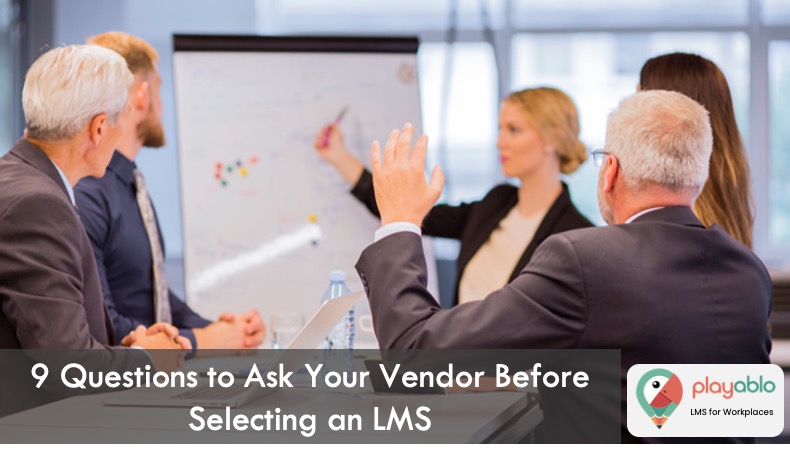When you decide to select an LMS or an online training program, it is an exciting endeavor — not to mention challenging in its way. Your first task is convincing management that your LMS is a worthwhile investment. A full-fledged LMS boosts employee productivity and efficiency and translates to an increased ROI. Hence, it is critical to pick a solution that best suits your organization’s needs.
When you select an LMS vendor, some of the fundamental questions you will ask your potential provider will concern the pricing and features of an online training program. However, there are several other questions that you should consider asking your vendor before deciding if they are fit for a long-term relationship with your firm. And this is where we come in. So, let’s get started!
Read More: How Much Does a Free LMS Really Cost?
Table of Contents
9 Questions to Ask Your Vendor Before You Select an LMS
1.Does Your LMS Have All the Features I Need?

The list of must-have features is specific to and differs according to the organizational needs. For instance, when you talk to your vendor before you select an LMS, ask about the required features such as your workflows, the learning environment, customization, personalized learning modules, content libraries, built-in content creation tools, integration with third-party software, gamification elements, and live classes/webinars.
Your online training program provider might bombard you with a massive catalog of features. But you might not use all of them. Hence, document what you need and keep your LMS search grounded.
Ad: PlayAblo’s Enterprise-Grade Micro-Learning platform is for the modern corporate learner. Moreover, micro-Learning, along with assessments and gamification features, ensures learning outcome measurement along with sustained engagement.
Find out more and request a custom demo!
2. How Will Your LMS Appeal to My Learners?
When you select an LMS, it should appeal to your learners so they are motivated to complete their training sessions. Each employee is unique and has different expectations from an LMS or online training program. Some may want to finish courses rapidly, while others want an easy way to keep track of upcoming deadlines. Someone might demand continual status updates on their courses.
Therefore, selecting an LMS or online training program should attract each category of learners. It should come with customized home pages designed to suit your learners in your environment following your workflows. Hence, ask your online training program vendor how they curate the LMS as per specific learner demands. Ask your provider how the LMS will appeal to your audience besides the generic organizational logo and color codes.
Read More: Before – During – After | Improving Knowledge Retention With eLearning Methodologies
3. What’s the Process for Creating and Distributing Content on Your Online Training Program?

Your vendor should offer you an online training program that comes with an easy-to-use content creation feature. Does the online training program have options for generating multimedia content, and embedding video with voiceovers, animations, and games? Can you add PDFs and eBooks and offer quizzes? Do you need additional tools for the same? What about revamping your old content?
For instance, if you use a solution like PlayAblo, you can easily convert all existing and relevant legacy content into eLearning pages. Also, when you select an LMS, ask if you can effortlessly update content and deliver new material to learners. Additionally, you need to know the processes for self-subscription and auto-subscription to new courses. Finally, it would be best if you also considered the availability of e-certificates and feedback/rating forms after course completion.
Ad: PlayAblo’s Enterprise-Grade Micro-Learning platform is for the modern corporate learner. Moreover, micro-Learning, along with assessments and gamification features, ensures learning outcome measurement along with sustained engagement.
Find out more and request a custom demo!
Read More: Design Top-Notch Workplace Learning Content by Overcoming These 5 Major Roadblocks
4. What Are the Security Measures That Will Protect My Data?
Your organization has data required for several vital functions. And learners will want to ensure that their data is safe. Again, managers need to track learner progress, and teams have to collaborate and share information. The LMS should enable L&D professionals to access reports — complete with employee performance reports and engagement rates. You must store all these data in a secure place and control who can see what. Additionally, your software should also allow learners to collaborate with peers and teammates, share learning materials, compare progress, and help each other.
Therefore, ask your LMS vendor if they have options that allow you to control permission to reports, test scores, and other learner records. It ensures that your employee information is used only for internal purposes. Even data backups must happen in a seamless, safe manner. Hence, discuss with your LMS provider if their hosting and storage structure complies with industry security standards.
5. What Percentage of the Training Process is Automated?
Training demands a lot of time spent in administration. This takes a toll on your company’s resources. But with the help of an LMS, you can automate several processes like enrollments, sending notices to learners, and generating regular reports. Ask your vendor about what percentage of the above-mentioned procedures is automated. Ensure how much information and content you can import automatically — without any errors, minus manual customization and tweaking.
6. What’s the Pricing Structure of Your LMS?

Pricing is one of the first questions you need to ask before selecting an LMS. You need to know how much you will be paying for your LMS. You should also see how the cost structure will change in the future — when you add new learners and content. Make sure about additional charges as your organization grows. Ensure that you ask what the price includes and what will demand extra charges. Consider if you will be spending vast amounts of cash on features that you will never use. Finally, ask your LMS provider about implementation assistance and ongoing support included in the pricing.
Read More: Cost of an Enterprise LMS. What is a Fair Price?
7. What Are Your After-Support Services?
Any good LMS vendor will offer support services after launching the software. Hence, ask your potential provider about the extent of their after-support services. How will they support you — beginning from implementation planning to deployment, and, especially, post the launch? How will they resolve an issue following the deployment phase? It’s vital to ensure the resolution time frame and availability of the support team.
Additionally, your LMS vendor should support you in other areas like administrator training and usage guidance. They must supply you with comprehensive tutorials and hand-hold your admins for the lifetime of your relationship. Make sure that you also ask them about the credibility of their online help system.
8. Do You Offer a Fully Functional Pilot With Support?
Try before you buy — this is an adage to follow before making any huge investment. While a free trial of your LMS is a no-brainer, it’s even better when your vendor gives you the option to try out a fully functional pilot with support. For example, PlayAblo provides you with the choice of going for an all-inclusive trial. Our team enables you to have a real-time view of how the LMS will function. There are options to view and try online learning sessions — live! What’s more? Our experts also hold training programs to guide you through the entire process.
9. What is Your Process of Customer On-boarding, Training and Handholding?

A reliable customer onboarding process enhances the lifetime value of customers, making them a valuable asset for your business. Hence, a focus on boosting customer retention and engagement with a comprehensive client onboarding process must be part of your growth strategy. Therefore, you must ask your LMS vendor about what training methods they use to onboard clients. You should also enquire if they can guide your customer through this entire step.
Read More: Role of L&D Managers in Improving Customer Experience
Conclusion
Selecting an LMS means that you are forging a long-term relationship with your LMS vendor. Choose a provider that will offer you ongoing support throughout all the stages — such as planning, launching, and using their platform. Pick a solution that is perfect for you now and will grow with your firm. Finally, settle for an LMS vendor that will promise a platform, which offers an engaging, simple learning experience!







1 Comment
Comments are closed, but trackbacks and pingbacks are open.